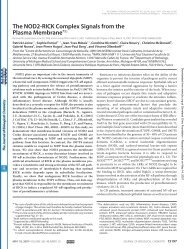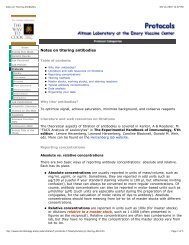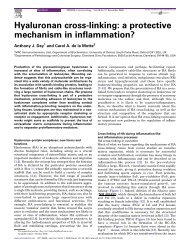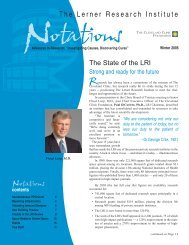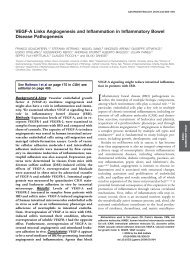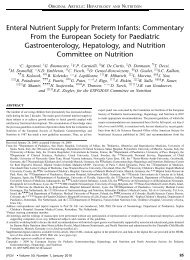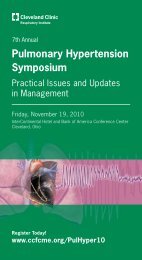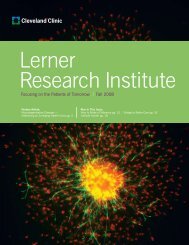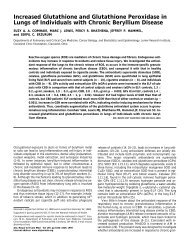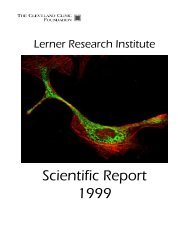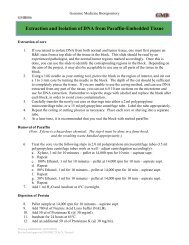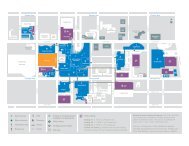Scientific Report 2003-2004 - Cleveland Clinic Lerner Research ...
Scientific Report 2003-2004 - Cleveland Clinic Lerner Research ...
Scientific Report 2003-2004 - Cleveland Clinic Lerner Research ...
- No tags were found...
You also want an ePaper? Increase the reach of your titles
YUMPU automatically turns print PDFs into web optimized ePapers that Google loves.
Our primary focus is on four main projectsrelating to multiple sclerosis:MRI Monitoring TechniquesIn collaboration with Dr. Elizabeth Fisher, wecontinue to develop MRI parameters as a moremeaningful measure of MS disease activity and severity.We focus on the use of a normalized measure of wholebrain atrophy–the brain parenchymal fraction. We areconducting longitudinal studies in patients with firstattack, relapsing-remitting MS, and both primary andsecondary progressive MS.Longitudinal Autoreactivity to Central NervousSystem AntigensThe relationship between immune cytokineresponses towards brain proteins and clinical measuresof disease progression in MS is poorly understood. In alongitudinal study mapping cytokine responses to myelinpeptides in MS patients/controls, we find that cytokineexpression patterns correlated with clinical findings,demographic factors and quantitative MRI. Our resultsshow that following MS patients over time by analysisof their cytokine patterns suggests that these importantimmune chemicals can be linked to MS patients'disability. Immune responses to specific regions ofmyelin proteins were highly dynamic over time andshowed bursts of activity coordinated with gadoliniumenhancedMRI lesions. These findings suggest that ourmethods are useful for tracking immune events and mayprovide beneficial markers for clinical trials in MS.Immunomodulatory Effects of MS TreatmentFew therapies are available for patients with themost rapidly debilitating form of multiplesclerosis, primary progressive MS (PPMS).Mitoxantrone is a newly approved therapy forMS, however, its mechanisms of action arepoorly understood. We measure macrophagesecretedcytokines that upregulate/downregulateT-cell functions as well asThe Department of Neurosciences<strong>Clinic</strong>al Approach Tests Immune Monitoring,Advanced Imaging to Understand andTreat Multiple Sclerosiseffects of mitoxantrone treatment on solublelevels of inflammatory mediators in the serum ofPPMS patients. Our recent studies focus on theeffect of mitoxantrone treatment on thelymphocyte surface expression of chemokinereceptors, molecules implicated in diseasepathogenesis in MS. Understandingmitoxantrone's mechanisms of action will help toimprove therapy for PPMS.Oxidative injury during CNS inflammationmight be linked to the rate of MS progression and brainatrophy. Thus, we are collaborating with Dr. StanHazen to examine products of oxidative tissue injury inMS. We quantify molecular markers specific foroxidative damage (e.g. nitrotyrosine) by HPLC with onlineelectrospray ionization tandem mass spectrometryusing methods developed in Dr. Hazen's lab. If our datashow consistently elevated CSF levels of nitrotyrosine,then it would suggest that the CNS in MS subjects is aunique site for oxidative damage. Inhibiting pathwayscontributing to nitrative stress could provide noveltherapeutic strategies for treatment of CNS oxidativeinjury in MS.Gender Differences in Immune Response in MSWe examine sex differences in multipleimmunological parameters (e.g., inflammatory andregulatory cytokines) to understand why more womenget MS than men. Our results show that IFNγ secretionto myelin peptides and proteins is elevated in females.We have examined whether exogenous sex hormonesalter the expression of cell-surface molecules thatpromote cellular inter-actions, known as co-stimulatorymolecules. We observe that expression of some costimulatorymolecules respond to in vitro exposure tosex hor-mones, and specifically to hormones that areeleva-ted in pregnancy. Finally, we are measuringexpres-sion of chemokine receptors on lymphocytes tolearn if these important chemical messengers play a rolein male/female differences in MS. Overall, learningmore about the gender differences in immune responseswill help improve MS therapy.THE RUDICKLABORATORYSTAFF SCIENTISTClara Pelfrey, Ph.D.ADVANCED POSTDOCTORAL FELLOWIoana Moldovan, M.D., Ph.D.SENIOR RESEARCH TECHNOLOGISTAnne Cotleur, M.S.TECHNOLOGISTNatacha Zamor, B..A.COLLABORATORSJeff Cohen, M.D. 2Elizabeth Fisher, Ph.D. 1Robert Fox, M.D. 2Jar-Chi Lee, M.S. 5Clara Pelfrey, Ph.D. 3Richard M. Ransohoff, M.D. 3Jack Simon, M.D. Ph.D. 4Lael Stone, M.D. 2Bruce D. Trapp, Ph.D. 3Stanley Hazen, Ph.D. 61Dept. of Biomed. Eng., CCF2Dept. of Neurology, MellenCenter, CCF3Dept. of Neurosciences, CCF4Dept. of Radiology-MRI, Univ. ofColo. Health Sci. Ctr., Denver5Dept. OF Biostat./Epidem., CCF6Dept. of Cell Biology, CCFRudick, R.A., Fisher, E., Lee, J.C., Duda, J.T., and J. Simon (2000) Brain atrophy in relapsing multiple sclerosis:relationship to relapses, EDSS, and treatment with interferon β-1a. Mult. Scler. 6:365-372.Richard A. Rudick, M.D.Pelfrey, C.A., Cotleur, A.C., Lee, J.-C., and R.A. Rudick (2002) Sex differences in cytokine responses to myelinpeptides in multiple sclerosis. J. Neuroimmunol. 130:211-223.Kivisakk, P., Trebst, C., Liu, Z., Tucky, B.H., Sorensen, T.L., Rudick, R.A., Mack, M., and R.M. Ransohoff (2002)T-cells in the cerebrospinal fluid express a similar repertoire of inflammatory chemokine receptors in the absenceor presence of CNS inflammation: implications for CNS trafficking. Clin. Exp. Immunol. 129:510-518.Chang, A., Tourtellotte, W.W., Rudick, R., and B.D. Trapp (2002) Premyelinating oligodendrocytes in chronic lesionsof multiple sclerosis. N. Engl. J. Med. 346:165-173.Rudick, R.A., Cutter, G., and S. Reingold (2002) The multiple sclerosis functional composite: a new clinical outcomemeasure for multiple sclerosis trials. Mult. Scler. 8:359-365.Fisher, E., Rudick, R.A., Simon, J.H., et al. (2002) Eight-year follow-up study of brain atrophy in patients withMS. Neurology 59:1412-1420.147



